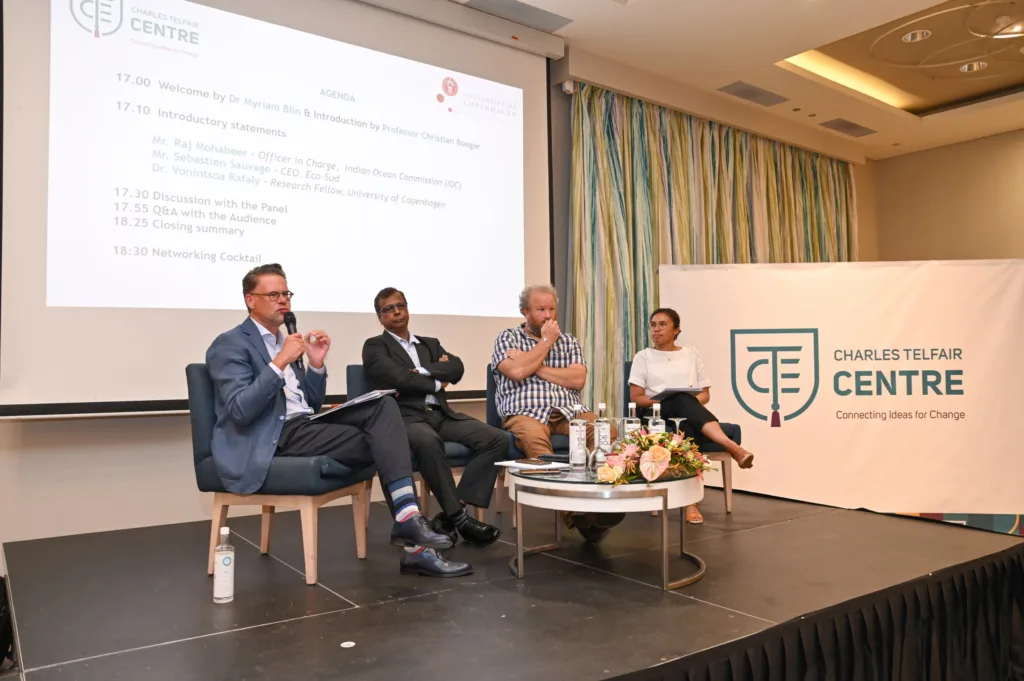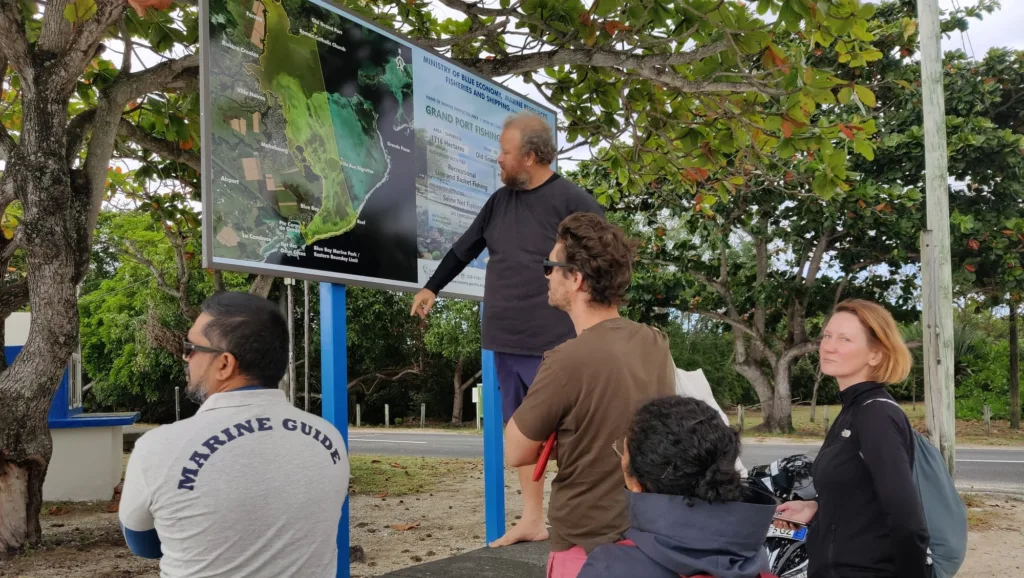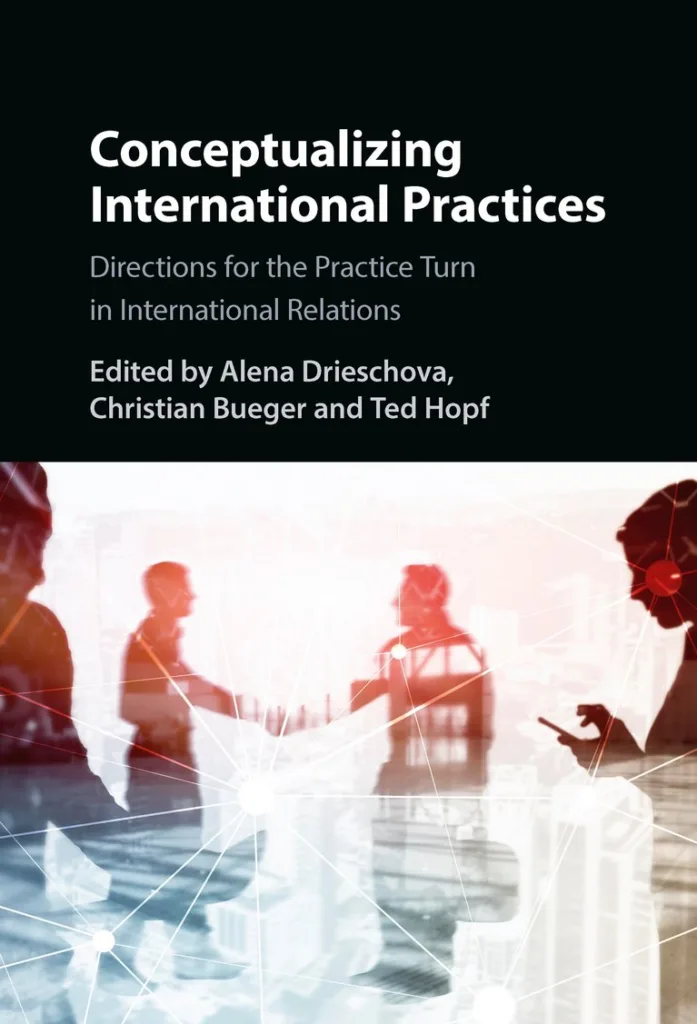How can regional sea states cooperate better to enhance maritime or energy security? This question is gaining increasing salience in different policy circles. On September 27th I had the pleasure to contribute to a debate organized by the Carnegie Endowment for International Peace in Washington, DC. The meeting was part of an upcoming series of discussions on the Baltic Sea region.
Category Archives: Events and Presentations
Writing retreat and field work in Mauritius
Over the last ten days I was with the team of the Ocean Infrastructure Research Group in Mauritius. Together we advanced the draft of our forthcoming book on ocean infrastructure and conducted field work on the 2020 Wakashio oil spill, which is one of our case studies.
In the book we develop a new understanding of global ocean politics by developing a framework centered on infrastructure. We argue that the concept of infrastructure opens productive new avenues for understanding global ocean politics that allows us to overcome the limits of thinking centered on territory, freedom or global commons. We show the evolution of the oceans as an infrastructural space, and show how we can rethink power, law, security and knowledge infrastructurally.

Fieldwork on shipping risks in small islands
Part of our stay in Mauritius was also a stakeholder workshop and a public event on shipping risks and the lessons from the 2020 Wakashio shipping accident which caused a major environmental disaster in the country. The event was covered in the national newspapers, and we also met with a range of stakeholders individually, including the minister on blue economy, fishing and shipping.

A particular important experience was a field visit to the site where the accident happened and the coastal region where the oil was spilled. The visit was organized by the local NGO EcoSud. It revealed that the clean up is completed, but that the disaster has some visible and lasting impact on the coastal eco-system, and there continues to be residues of oil in the mangrove forests. In other words, the disaster is not over, but will have to be managed carefully in the years to come.
Visit to Bangkok and Singapore
Over the next two weeks I will be giving a range of talks in Thailand and Singapore. On the 12th I am attending the Southeast Asia Maritime Law Enforcement Initiative (SEAMLEI), 9th Annual Commanders’ Forum and give a talk on the consequences of climate change for maritime security planning and operations.
On the 13th I will be speaking at an event on Critical Maritime Infrastructure Protection in Southeast Asia organized by the National University of Singapore’s Center of International Law. I will focus in particular on the consequences of green energy expansion for Singapore and the South China Sea.
From the 16th I am attending the Regional Maritime Security Practitioner Programme (RMPP) of the Singapore Navy. The Programme is one of the capstone events of the Information Fusion Center in Singapore and brings together over 100 participants from across the world. It is one of the world’s largest gatherings of maritime security practitioners and maritime domain awareness specialists. At the event, I will be giving a presentation on current trends in maritime security drawing on our book forthcoming with Oxford University Press (with Tim Edmunds) and chair a panel on current threats in the region.
Consultative security forum in Ireland
Ireland is an island, and its security is dependent on the sea. On June 22nd I had the opportunity to contribute to the countries ongoing Consultative Forum on International Security Policy. The goal of the forum is to inform the public debate about the future options of the countries security policy and its tradition of neutrality.
In my contribution, some of which is summarized in this article, I stressed that Ireland is in a new era because it’s dependency on maritime infrastructure is increasing, and the Nord Stream attacks demonstrates that it is vulnerable. I emphasized the importance of close cooperation in the region within the EU and in mini-lateral formats.
European Council away day on maritime security
As part of the presidency of the European Council, Sweden is inviting the members of the Council working group on maritime security for an away day. The program focuses on the future of maritime security, the Baltic Sea, as well as a range of social, cultural and military-related visits and activities. The event takes place in Karlskrona, the main Swedish naval base in the Baltic, and a city with a long maritime heritage, 13-15.7.2023.
Participating in the event, I am giving a talk on critical maritime infrastructure protection in Europe with a focus on the North Sea, as well as participating in a roundtable on the future of maritime security in the EU.
Lecture on maritime security @IMLI
Today, I had the pleasure to give a lecture to the students of the specialized course in International Maritime Security Law at the International Maritime Law Institute (IMLI), Malta.
In my lecture I addressed the role of the European Union as a global maritime security provider. I reviewed the evolution of the EU’s maritime security thinking starting out from early counter-piracy operations in the 2010s and the expansion of capacity building programs on a global level.
I also discussed the ongoing update of the EU’s Maritime Security Strategy and the new priorities it sets out, including in the fields of capability development, maritime domain awareness and critical maritime infrastructure protection.
Baltic Sea Strategy Forum in Copenhagen
On May 11th I had the pleasure to give a talk at the 2023 Baltic Sea Strategy Forum hosted by the Royal Danish Defence College. The event saw the participation of the Chief of Navies from Denmark and Sweden was a timely opportunity to consider the current situation in the Baltic Sea in the light of the war in Ukraine.
In my presentation, I reviewed the current efforts of NATO in critical maritime infrastructure protection. While NATO has shown considerable interest in this field, including by the creation of a coordination cell and a meeting with industry stakeholders, the reach of the alliance will be limited, considering the need for civil-military cooperation to effectively deter, prevent and react to greyzone activities and hybrid threats.
Roundtable and book launch on international practice theorizing
On the 10th of May we are discussing the state and future of international practice theorizing at an event in Copenhagen.

Practice theorizing has become one of the most important approaches in political science and international relations. This roundtable reflects on the state of the debate in the light of the recently published book “Conceptualizing International Practices” (Cambridge University Press, 2022).
The book edited by Alena Drieschova, Christian Bueger and Ted Hopf, engages in conversations around key concepts, like power, change, normativity, or knowledge. It shows the value of theorizing politics and the international through practice.
Theorizing practices: Taking the next steps
Roundtable and book launch, 10.5.2023, 14.30-16.00
Department of Political Science, CSS, Øster Farimagsgade 5, Building 4, Room 4.2.26
Speakers: Christian Bueger (chair), Alena Drieschova (Cambridge University), Jon Austin, Rebecca Adler-Nissen (Department of Political Science), Bente Halkier (Department of Sociology), and Nora Stappert (Faculty of Law). All are welcome.
Conference in Singapore

From the 3rd to the 5th of May, I will have the pleasure to attend the International Maritime Conference, organized by RSIS and the Singapore navy.
I am also scheduled to attend a series of side events focused on different aspects of maritime security in Southeast Asia and the Indo-Pacific. The conference provides an ideal opportunity to gauge where the maritime security debate in the region is heading.
Maritime security in Geneva
The Leadership in International Security Course is the flagship executive training by the Geneva Centre for Security Policy (GCSP). I am delighted to teach a session on maritime security in the course on May, 2nd.
Maritime security is a vital component of contemporary security politics, and it is great that the GCSP includes it in the course. In the session, I will summarize the key insights from our forthcoming book Understanding Maritime Security (with Tim Edmunds).